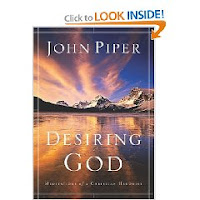God's Smuggler, Brother Andrew (Fall/Winter 2005)

This is the autobiography of Brother Andrew (now the leader and figurehead of Open Doors), a dutch Christian who was saved as a teenager and called to an amazing ministry. He spent years of his early life smuggling Bibles into communist countries, mostly in Eastern Europe. Megan read this while I read Heavenly Man, and then we switched. I think that God really used these books to give us a heart for the nations and to move us to consider going to China. Brother Andrew's faith is amazing, and the stories he tells are encouraging and instructional.
Desiring God, John Piper (Fall 2006)

Thus begins the massive impact of John Piper on my thinking and on my Christian life. This book rocked my world as I read it during our first semester in China. I began to realize that my Christian walk consisted almost entirely of thinking, and very little of feeling and loving. I began to beg God to give me joy and affection for him. This was the beginning of a new chapter in my walk with the Lord. The book is somewhat difficult, but not as bad as I've heard some people say. Too many Christian books don't engage the mind enough. Desiring God requires slow and deliberate reading, and it's well worth every page.
Pleasures of God, John Piper (Spring 2007)

I read this toward the end of my first year in China. It's probably my second favorite Piper book, behind Desiring God. It continued the reorientation of my understanding of God that began when I read Desiring God. Specifically, I began to accept a Calvinistic theology from an informed standpoint, interacting with Piper's arguments. God used this book to destroy my delusions of having a free will apart from him. I read The Forgotten Spurgeon at the same time, which supplemented all of these thoughts.
The Forgotten Spurgeon, Iain Murray (spring 2007)

This book is a biography of the 3 major controversy's which C.H. Spurgeon was involved in - Calvinism, baptismal regeneration, and the downgrade. It's a fascinating book on multiple fronts. Murray's chapter on the effects of Arminianism on evangelism is worth the price of the book. The latter chapters provide a insightful look at one of the single most important events in the history of evangelicalism in the past several centuries. Namely, the liberalization of the Baptist Union. The biggest effect that this book had on my thinking was with regard to mothods of evangelism. Particularly, respecting God's sovereignty in salvation in my methods of EV and discipleship.
Studies in the Sermon on the Mount, Martyn Lloyd-Jones (Winter 2007, I think)

I actually haven't completely finished this book. But it's not a connected story, only a collection of sermons, so I don't need to finish it to assess it accurately I don't think. These are some of the most challenging and sanctifying sermonds I've read. I committed to read one sermon a day after my quiet time during a period when Megan and I were in Bluefield, before returning to China. God used this book to really challenge me in some basic Christian areas - love for others, love for and pursuit of God, sharing my faith, etc. This is a great book and helpful resource.
Future Grace, John Piper (Winter 2008)
 Megan and read this together, and at the same time we were doing a Bible study in our small group on the book Battling Unbelief, also by Piper, which is actually just a abbreviated version of Future Grace. The book is rather rhetorical and repetative, but Piper's point is that by the time you finish it the main thesis of the book has so pervaded your thought as to become the new standard. The thesis is this: Christian obedience ought not result from thankfulness for what God has done, but from faith that he will bless obedience and continue to provide grace to enable it. Faith, not thankfulness, is the root of obedience. This has really transformed my thinking.
Megan and read this together, and at the same time we were doing a Bible study in our small group on the book Battling Unbelief, also by Piper, which is actually just a abbreviated version of Future Grace. The book is rather rhetorical and repetative, but Piper's point is that by the time you finish it the main thesis of the book has so pervaded your thought as to become the new standard. The thesis is this: Christian obedience ought not result from thankfulness for what God has done, but from faith that he will bless obedience and continue to provide grace to enable it. Faith, not thankfulness, is the root of obedience. This has really transformed my thinking.Dominion and Dynasty, Stephen Dempster (summer 2009)

This is a theology of the Old Testament. It's one of those books where, literally on every page, I saying, "Whoa! Now I see! I had never understood that before!" Dempster argues that the OT, read in the traditional Jewish order of books and not in the Christian order (the order in your Bible) reads as a continual narrative rather than a disjunctive collection of stories. In this light, he explains the main idea behind each book of the OT, highlighting the themes of dominion (the promise of land) and dynasty (the promise of descendents) throughout. It gets technical at times, but generally is not a difficult read. This book has changed the way I read the Bible, both OT and NT.



0 comments:
Post a Comment